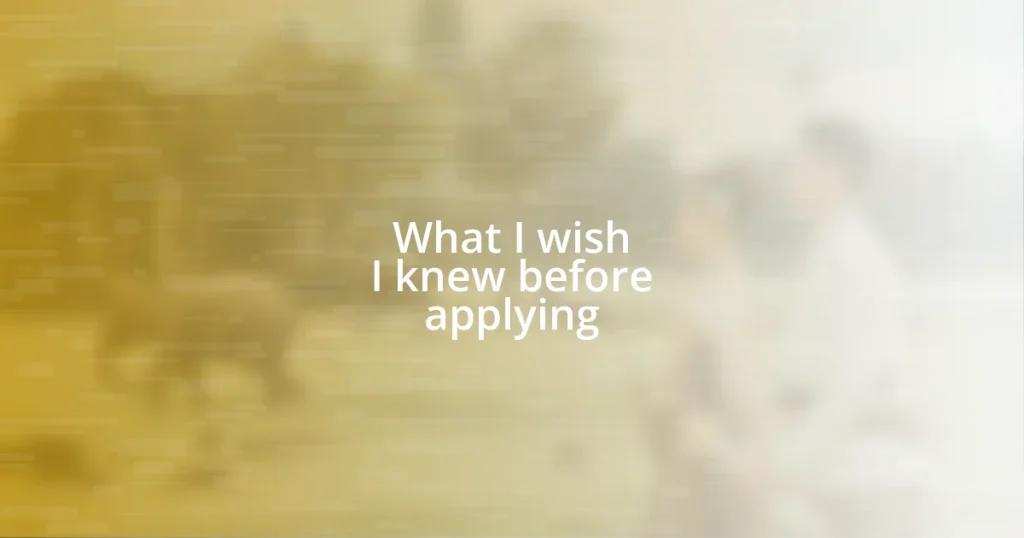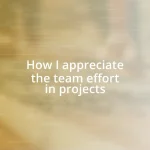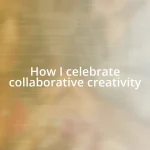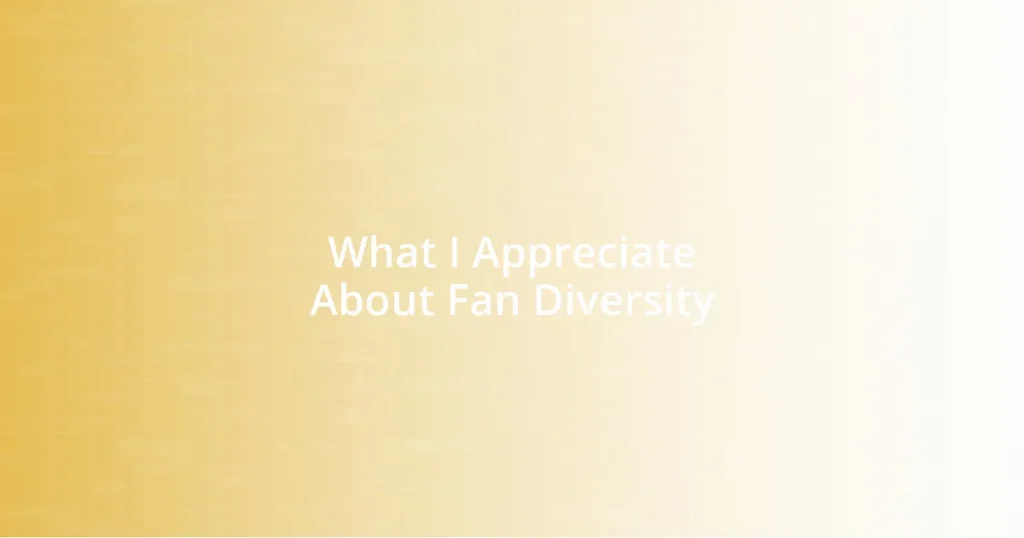Key takeaways:
- Break the application process into manageable steps, prioritize deadlines, and seek help from admissions offices or current students.
- Personalize each application, conduct thorough research on target programs, and highlight specific experiences in your personal statement.
- Select genuine recommenders who understand your journey, prioritize effective communication, and embrace vulnerability in your personal narrative to create a memorable impression.

Understanding the application process
Navigating the application process can often feel like wandering through a maze. I remember the confusion I felt when I first encountered the myriad of requirements and forms—did I really need that extra letter of recommendation? It’s important to break everything down into manageable steps and keep a checklist handy to avoid missing any crucial details.
One of the most eye-opening moments for me was realizing that deadlines don’t just appear on calendars; they can sneak up on you! I once lost track of time and almost missed a critical submission date, which sent my stress levels soaring. Trust me, marking your deadlines in bold and treating them as non-negotiable can save you a lot of panic down the line.
As I delved deeper into the process, I learned that insight comes from reaching out for help. Don’t shy away from contacting admissions offices or connecting with current students. Their perspectives can illuminate parts of the application journey that you might not have considered—like how to craft a compelling personal statement that truly reflects your unique story. What if your authenticity is what sets you apart? It’s worth exploring!

Common mistakes to avoid
One of the most common mistakes I see among applicants is overlooking the importance of tailoring each application. I remember the sense of relief I felt when I submitted a generic personal statement, only to realize later how much stronger it could have been if I had personalized it for each school. Admissions committees are looking for authenticity, so make sure your application reflects why you’re a perfect fit for their program.
To help you steer clear of these pitfalls, consider the following tips:
- Neglecting Research: Don’t skip the research on the programs you’re applying to. Understand their values, what they offer, and why you’re drawn to them.
- Rushing: Don’t wait until the last minute to write your essays. Plan ahead and give yourself time to revise.
- Ignoring Instructions: Carefully read application instructions. For instance, if a program specifically requests a certain format, follow it!
- Being Vague: Avoid generic statements. Instead, share specific experiences and how they shaped your goals.
- Overlooking Proofreading: Mistakes in grammar or spelling can detract from your professionalism. Use tools or ask someone to edit for you.
By sidestepping these common missteps, you can present your best self and maximize your chances of success.

Researching your target program
Researching your target program is more than just skimming through the website. I remember spending countless hours digging into every detail about my desired program. I found that understanding faculty research, curriculum structure, and even student organizations helped me visualize my future there. Isn’t it fascinating how much the right program can align with your career goals? Making these connections early on motivated me to tailor my application thoughtfully.
One aspect I underestimated was the importance of program culture. I attended info sessions and webinars to grasp the vibes and dynamics of different programs. It was enlightening—some emphasize collaboration, while others lean toward competition. I once overlooked this and applied to a program that wasn’t the right fit for my personality. When I finally realized it—thanks to my research—I pivoted my focus and made a more informed decision that better matched my aspirations.
Let’s break down the features to consider during your research. Finding a balance between academic offerings and community engagement can be pivotal. A simple comparison table can help you visualize the differences effectively:
| Feature | Program A | Program B |
|---|---|---|
| Faculty Expertise | Strong in X and Y | Strong in Z |
| Class Size | Small (15-20) | Large (50-60) |
| Internship Opportunities | Well-connected | Limited access |
| Community Engagement | High | Moderate |
By comparing these key elements, you not only equip yourself with knowledge, but also set a foundation for a compelling application that speaks to why you chose that program. It really pays off to dive deep!

Preparing your application materials
Preparing your application materials can feel overwhelming, but trust me; it’s a key step in standing out. I vividly recall spending late nights refining my resume. I challenged myself to think about my achievements in a new light, emphasizing not just what I did, but why it mattered, which ultimately transformed my resume from a list of tasks to a narrative that showcased my passion.
One critical element that helped me immensely was creating a checklist. I gathered all required documents, from transcripts to recommendation letters, making sure I understood each element’s purpose in my overall application. Honestly, checking off each item felt like a small victory. What’s more gratifying than seeing your hard work come together? Reflecting on this, I realized that organization not only saved me time but also reduced my anxiety as deadlines approached.
Don’t underestimate the power of personal statements—they’re a window into your journey. I wrote multiple drafts, each one revealing new insights about myself. I asked friends for feedback, which not only refined my language but also illuminated aspects of my character I hadn’t fully recognized. How often do we overlook the importance of collaboration in such a solitary process? Sharing my drafts made me realize that our stories resonate deeply with others, and that connection is invaluable when preparing your application.

Selecting the right recommenders
Finding the right recommenders can significantly bolster your application, but it’s not just about who has a prestigious title. I made the mistake of thinking that only big names would impress the admissions committee. Instead, I learned that having a recommender who truly knows you and your work can provide a more personalized and compelling endorsement. Reflecting on my own experiences, I remember one of my recommenders was a professor whose class I barely scraped by in, yet he recognized my determination and growth. His insights felt genuine and, frankly, that authenticity shone through in his letter.
Consider the qualities that you need in a recommender. I found it beneficial to select individuals who could articulate my strengths and growth areas, rather than those who simply view me through rose-colored glasses. Think about a past boss or mentor who has witnessed your achievements firsthand. Their perspective can provide a sense of continuity in your personal and professional development. Have you thought about the chances you’ve taken that led to essential lessons? A recommender who can weave those narratives into their recommendation adds layers of depth that can truly set your application apart.
Lastly, I always make it a point to approach recommenders well in advance. I clearly communicated my goals and why I thought they were the right fit. I reminisced with one of my recommenders over coffee about our shared moments that shaped my path. It was a heartwarming connection that allowed him to infuse personal anecdotes into his letter, making it resonate more. So, when you’re selecting recommenders, don’t underestimate the power of genuine relationships and timely communication—they can make a world of difference.

Crafting a compelling personal statement
Crafting a compelling personal statement is an opportunity to really showcase who you are beyond your grades and test scores. I remember the moment I realized this; it was when I poured my heart into describing an unexpected challenge I faced during an internship. That raw honesty captured not just my resilience but also my growth, allowing the readers to connect with me on a personal level. Have you thought about how your unique experiences could reflect your values and aspirations?
The importance of storytelling cannot be overstated in a personal statement. I learned to weave in anecdotes that illustrated crucial moments in my life—like the time I led a team project that failed spectacularly, but taught me invaluable lessons about teamwork and leadership. This shifted my narrative from merely recounting experiences to creating a vivid image of my journey. Engaging the reader with well-chosen moments helps humanize your application; after all, who doesn’t appreciate a good story?
Lastly, don’t shy away from vulnerability. I distinctly remember hesitating to share a personal setback, fearing it would diminish my application. Surprisingly, it did the opposite. By highlighting my struggles alongside my achievements, I painted a fuller picture that resonated with the readers. If your story can evoke emotions, it creates a memorable impression—so, why not embrace your genuine self?
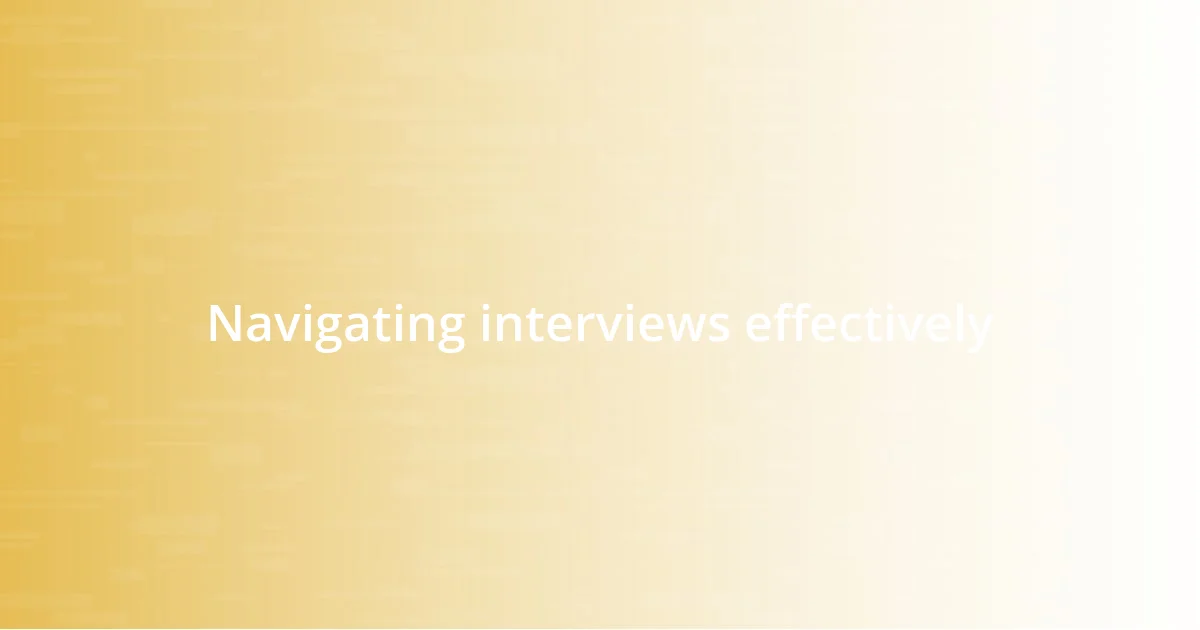
Navigating interviews effectively
Navigating an interview effectively requires a blend of preparation and spontaneity. I vividly recall my first big interview; my nerves were palpable, and I spent hours rehearsing answers. But as soon as I walked into the room, I realized that being genuine was more impactful than delivering a perfect script. Each question became an opportunity for a real conversation instead of a performance.
One crucial insight I’ve gained is the importance of asking questions during interviews. Early on, I focused solely on answering, but asking insightful questions not only shows your interest but also helps you assess if the organization aligns with your goals. I remember one interview where I asked about the team’s culture. This opened up a discussion that revealed shared values and helped me feel more connected to the position. What do you think could happen if you put your curiosity front and center?
Body language also plays a vital role in interviews. I once bombed an interview not because of my answers, but because I fidgeted and avoided eye contact. It was a tough lesson, but I learned that confident body language can convey enthusiasm and engagement. Now, I practice standing tall and making eye contact, reminding myself that the interview is not just an evaluation but a dialogue where both parties are exploring a potential partnership. How can shifting your body language transform the way you communicate your passion?










